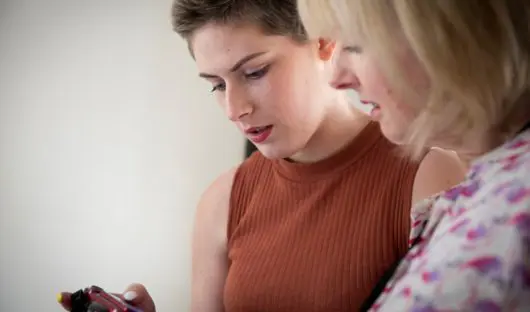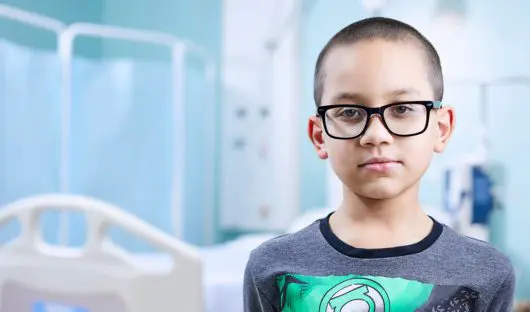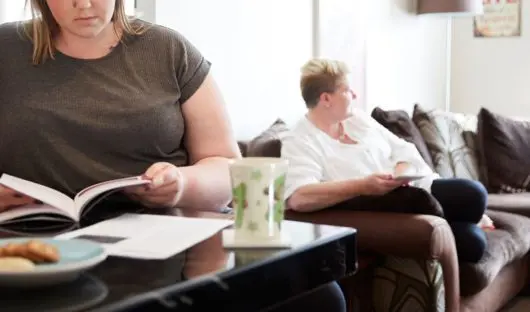Taking control of your care
When you’re having treatment, it’s easy to feel that you aren’t in control. Everyone has a different relationship with their hospital team. Yours might talk to you first and foremost, and include you in every conversation. Or you might feel that your parents are in the driving seat. How much you want to be involved is up to you but at the least, you should feel the people looking after you are on your side – and that you can talk to them about anything.
How can I feel more in control?
If you’ve been diagnosed recently, you might feel that it’s been a bit of a whirlwind. Decisions might have been made on your behalf about your treatment and certain aspects of your life. Obviously, it’s important to focus on dealing with the emotional fallout, and just ‘getting through it’ might be the most you can take on at the moment.
But the thing is – this diagnosis affects you first and foremost. It’s your life that’s going to be impacted the most. So if you want to understand what’s happening around you, and why, then you should feel empowered to stand up and say so.
There are steps you can take to make sure this happens. Firstly, if your parents are the ones involved in all the discussions – talk to them and say that you want to be included. You should also have the opportunity to tell your consultant this. If your treatment is in a young people’s centre then it’s likely they’ll be pretty good at this anyway.
Also, if you don’t understand something that’s been said – or if you want something explained again – make sure you ask. It can help to make a note of things as they pop into your head. Maybe keep a list on your phone. That way, you can run through everything you’ve been wondering about at the next opportunity.
Remember, you have the right to ask questions and ultimately, you are in charge of what happens to you.
Can I talk to my team in private?
If you want to talk to a professional by yourself, you should always have this choice. It’s especially important if you need to discuss medical history or lifestyle choices honestly. If you feel awkward asking your parents or partner to leave, you could speak to a member of your care team beforehand and see if they can help you with this. Or try to catch them afterwards if you’ve not been able to say everything you want.
Who can I speak to?
During your cancer treatment, you’ll meet different people who all work together to provide you with the best possible care.
The people you’re most likely to see during your treatment include your nurse, consultant, GP, Young Lives vs Cancer Young People’s Social Worker or Community Worker, or anyone else involved in your care at hospital. You should be able to talk to any of these people about any concerns or worries you have.
Wherever you’re treated, you’ll have a multi-disciplinary team or MDT. This is a group of health and social care professionals who meet and make decisions about your care. You might also have a teenage and young adult multi-disciplinary team (or TYA MDT). They specialise in the treatment of young people with cancer – so will also look at things like your needs and wellbeing. They advise any hospital MDTs treating 16 to 24-year-olds to make sure they get the most appropriate treatment, care and support.
Professionals who may be involved in your care include:
A senior doctor will take the lead in your diagnosis and treatment. They may be known as a specialist, a consultant or have some other title. They will usually specialise in the type of cancer that you have been diagnosed with. You may not see this person every time you visit the hospital – sometimes you might see other doctors on the consultant’s team. If you want to discuss anything with them, you can always ask for an appointment. There are several different types of consultants you may meet:
Oncologist
A doctor who treats people with cancer. There are three types of oncologist. Clinical oncologists treat patients of all ages with radiotherapy, and adults with drug treatments. Medical oncologists treat adult patients with drug treatments. Paediatric oncologists treat children with drug treatments.
Haemotologist
A doctor who specialises in blood disorders, including leukaemia and lymphoma.
Surgeon
This doctor will specialise in the type of surgery related to your condition.
You may have a Young Lives vs Cancer Young People’s Social Worker or Community Worker based at the Principal Treatment Centre in your area, who can provide emotional support as well as practical help with financial issues, education, employment and training.
These are nurses who have had extra training in certain areas of care. The type of specialist nurses may vary between hospital teams. Your team may include:
- Paediatric specialist nurses who support children with cancer and leukaemia
- Teenage and young adult specialist nurses who support young people up to the age of 24
- Cancer site-specific nurses who support people with a specific type of cancer, such as a lymphoma nurse specialist or a sarcoma nurse specialist
- Late effects nurse specialists who support children and young people through any long-term effects of their treatment.
Play specialists help children cope with their fears and prepare for treatment through play, using toys, books, games, props and craft materials. They build a relationship with each child, so he or she learns to trust them.
There is no ‘one size fits all’ – play specialists base their work activities around how the child is feeling. They can often help even young children manage minor procedures (like lying still for radiotherapy) without having to have a general anaesthetic.
Despite the name, a play specialist does a lot more than play! Their support helps children:
- Express their thoughts and feelings in a constructive way
- Prepare for procedures and feel less anxious
- Develop coping skills and build self-esteem
- Debrief after traumatic events and hospital procedures
They specialise in the drugs used to treat cancer. They can give advice about the side effects of a particular drug and can help your doctors with prescribing drugs to control things like pain or nausea.
A doctor who specialises in interpreting X-rays or scans to help with your diagnosis or treatment.
This is the person who operates the machine that gives you radiotherapy treatment.
A diagnostic radiographer is the person who operates the machines that take your x-rays or scans.
They carry out day-to-day care and provide ongoing treatment, including giving injections and taking blood samples.
These nurses provide care at home and any medication you may need.
These doctors, under the supervision of the oncologist, will do most of your tests and treatments.
They care for you when you’re back at home. Your consultant will keep the GP informed about your treatment.
Your pain team are specialists in helping you with any pain or other symptoms, such as nausea or loss of appetite, caused by your cancer or its treatment.
Your dietitian will provide you with nutritional advice to help you deal with your treatment and any side effects.
A specialist in using exercise and activities to help you during your treatment and also to help you recover physically afterwards.
An occupational therapist can help you maintain the physical and psychological skills that you need to continue with your day-to-day life.
They may be available at your treatment hospital to help you deal with your diagnosis, treatment and beyond.
How do I get the information I need?
Having good information when you need it most can really help to make sense of things. It’s tempting to start googling but the internet definitely isn’t always the best place to get answers relevant to you. Instead, ask someone on the team of people caring for you.
Even if the person you speak to can’t help you directly, they will be able to help you find someone who can. It might feel strange to open up about personal things with someone you don’t know well, but they will have heard all your questions before.
We also have lots of advice about how to manage the impact of cancer on different aspects of your life. Or download or order our booklets free of charge.
You might also like to read
Where will I have my treatment and do I get a say?
If your place of treatment hasn't been decided, it’s important you ask about your options.
Read more
Going to hospital for the first time
A guide to going to hospital for the first time and what you can expect as a young person.
Read more
How your parents feel when you are first diagnosed
How your parents or carers might feel when you are first diagnosed with cancer.
Read more